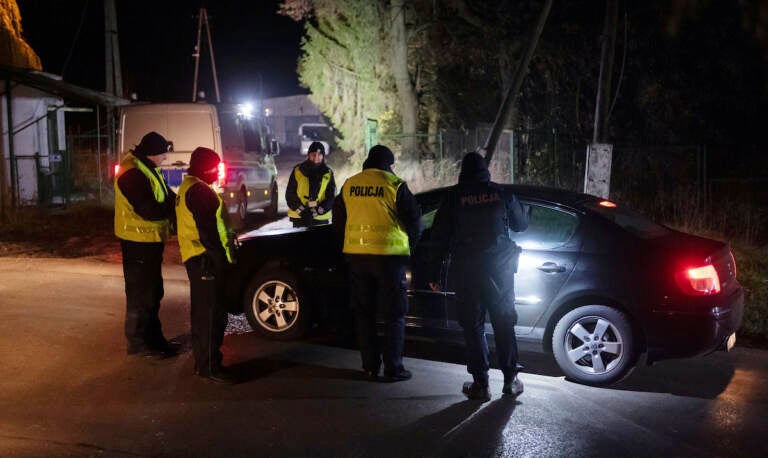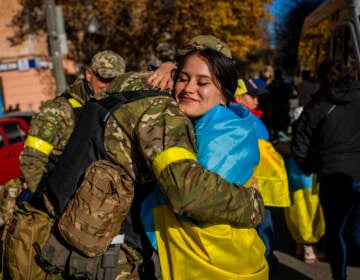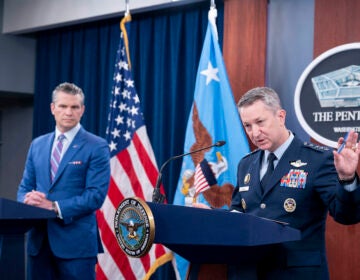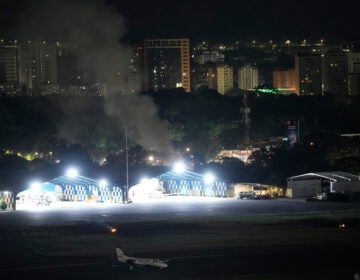Poland: Russian-made missile fell on our country, killing 2
The Polish government said in a statement that Foreign Minister Zbigniew Rau summoned the Russian ambassador and “demanded immediate detailed explanations.”

Police officers gather outside a grain depot in Przewodow, eastern Poland, on Tuesday Nov. 15, 2022 where the Polish Foreign Ministry said that a Russian-made missile fell and killed two people. (AP Photo)
Poland said early Wednesday that a Russian-made missile fell in the eastern part of the country, killing two people in a blast that marked the first time since the invasion of Ukraine that Russian weapons came down on a NATO country.
Ukrainian President Volodymr Zelenskyy decried the strike as “a very significant escalation” of the war.
Polish Prime Minister Mateusz Morawiecki said the government was investigating and raising its military preparedness.
A statement from the Polish Foreign Ministry identified the missile as being made in Russia. But President Andrzej Duda was more cautious about its origin, saying that officials did not know for sure who fired it or where it was made. He said it was “most probably” Russian-made but that is being still verified.
Meanwhile, NATO Secretary-General Jens Stoltenberg called an emergency meeting of the alliance’s envoys to discuss the events close to the Ukrainian border in Poland.
Poland’s statement did not address the circumstances of the strike, including whether it could have been a targeting error or if the missile could have been knocked off course by Ukrainian missile defenses.
If Russia had deliberately targeted Poland, it would risk drawing the 30-nation alliance into the conflict at a time when it is already struggling to fend off Ukrainian forces.
Polish media reported that the strike took place in an area where grain was drying in Przewodów, a village near the border with Ukraine.
The Russian Defense Ministry denied being behind “any strikes on targets near the Ukrainian-Polish border” and said in a statement that photos of purported damage “have nothing to do” with Russian weapons.
Polish Foreign Minister Zbigniew Rau summoned the Russian ambassador and “demanded immediate detailed explanations,” the government said.
On Tuesday, Russia pounded Ukraine’s energy facilities with its biggest barrage of missiles yet, striking targets across the country and causing widespread blackouts.
The barrage also affected neighboring Moldova. It reported massive power outages after the strikes knocked out a key power line that supplies the small nation, an official said.
The missile strikes plunged much of Ukraine into darkness and drew defiance from Zelenskyy, who shook his fist and declared: “We will survive everything.”
In his nightly address, the Ukrainian leader said the strike in Poland offered proof that “terror is not limited by our state borders.”
“We need to put the terrorist in its place. The longer Russia feels impunity, the more threats there will be for everyone within the reach of Russian missiles,” Zelenskyy said.
Russia fired at least 85 missiles, most of them aimed at the country’s power facilities, and blacked out many cities, he said.
The Ukrainian energy minister said the attack was “the most massive” bombardment of power facilities in the nearly 9-month-old Russian invasion, striking both power generation and transmission systems.
The minister, Herman Haluschenko, accused Russia of “trying to cause maximum damage to our energy system on the eve of winter.”
The aerial assault, which resulted in at least one death in a residential building in the capital, Kyiv, followed days of euphoria in Ukraine sparked by one of its biggest military successes — the retaking last week of the southern city of Kherson.
The power grid was already battered by previous attacks that destroyed an estimated 40% of the country’s energy infrastructure. Zelenskyy said the number of Ukrainians without power had fallen from 10 million to 2 million by Tuesday evening.
Russian President Vladimir Putin has not commented on the retreat from Kherson since his troops pulled out in the face of a Ukrainian offensive. But the stunning scale of Tuesday’s strikes spoke volumes and hinted at anger in the Kremlin.
By striking targets in the late afternoon, not long before dusk began to fall, the Russian military forced rescue workers to labor in the dark and gave repair crews scant time to assess the damage by daylight.
More than a dozen regions — among them Lviv in the west, Kharkiv in the northeast and others in between — reported strikes or efforts by their air defenses to shoot missiles down. At least a dozen regions reported power outages, affecting cities that together have millions of people. Almost half of the Kyiv region lost power, authorities said.
Zelenskyy warned that more strikes were possible and urged people to stay safe and seek shelter.
“Most of the hits were recorded in the center and in the north of the country. In the capital, the situation is very difficult,” said a senior official, Kyrylo Tymoshenko.
He said a total of 15 energy targets were damaged and claimed that 70 missiles were shot down. A Ukrainian Air Force spokesman said Russia used X-101 and X-555 cruise missiles.
As city after city reported attacks, Tymoshenko urged Ukrainians to “hang in there.”
With its battlefield losses mounting, Russia has increasingly resorted to targeting Ukraine’s power grid, seemingly hoping to turn the approach of winter into a weapon by leaving people in the cold and dark.
Dutch Foreign Minister Wopke Hoekstra took to a bomb shelter in Kyiv after meeting his Ukrainian counterpart and, from his place of safety, described the bombardment as “an enormous motivation to keep standing shoulder-to-shoulder” with Ukraine.
The strikes came as authorities were already working furiously to get Kherson back on its feet and beginning to investigate alleged Russian abuses there and in the surrounding area.
The southern city is without power and water, and the head of the U.N. human rights office’s monitoring mission in Ukraine, Matilda Bogner, on Tuesday decried a “dire humanitarian situation” there.
Speaking from Kyiv, Bogner said her teams are looking to travel to Kherson to try to verify allegations of nearly 80 cases of forced disappearances and arbitrary detention.
The head of the National Police of Ukraine, Igor Klymenko, said authorities are to start investigating reports from Kherson residents that Russian forces set up at least three alleged torture sites in now-liberated parts of the wider Kherson region.
The retaking of Kherson dealt another stinging blow to the Kremlin. Zelenskyy likened the recapture to the Allied landings in France on D-Day in World War II, saying both were watershed events on the road to eventual victory.
But large parts of eastern and southern Ukraine remain under Russian control, and fighting continues.
In other developments, leaders of most of the world’s economic powers were drawing closer to approval of a declaration strongly denouncing Russia’s invasion.
On Tuesday, U.S. President Joe Biden and Zelenskyy pressed fellow G20 leaders at the summit in Indonesia for a robust condemnation of Russia’s nuclear threats and food embargoes. More discussion and a possible vote come Wednesday.
___
Associated Press writers Joanna Kozlowska in London; Jamey Keaten in Geneva; Mike Corder in The Hague, Netherlands; Hanna Arhirova in Kherson, Ukraine; Yuras Karmanau in Tallinn, Estonia; Vanessa Gera and Monika Scislowska in Warsaw, Poland; Raf Casert and Lorne Cook in Brussels; and Nomaan Merchant in New York contributed to this report.
WHYY is your source for fact-based, in-depth journalism and information. As a nonprofit organization, we rely on financial support from readers like you. Please give today.






